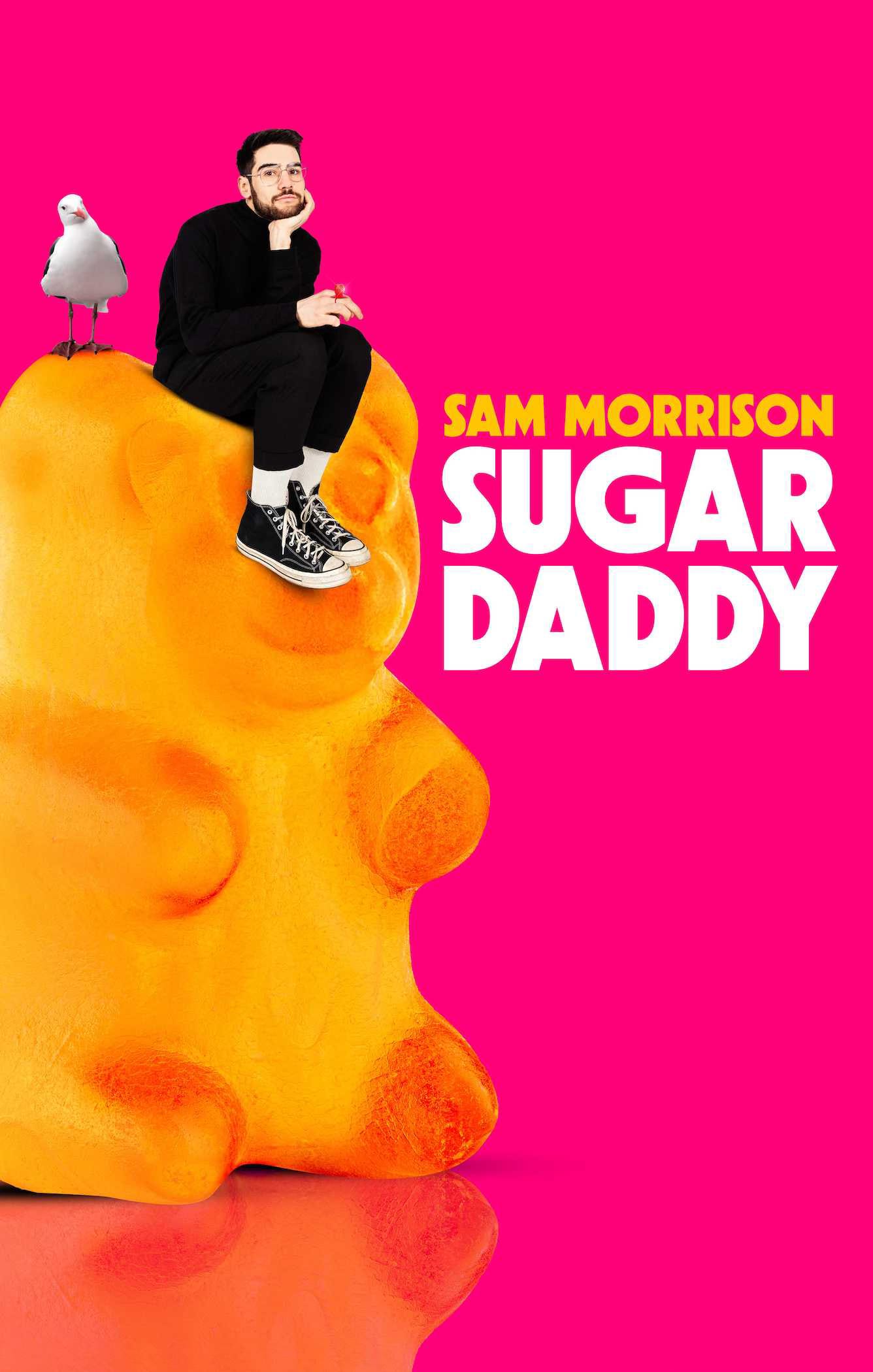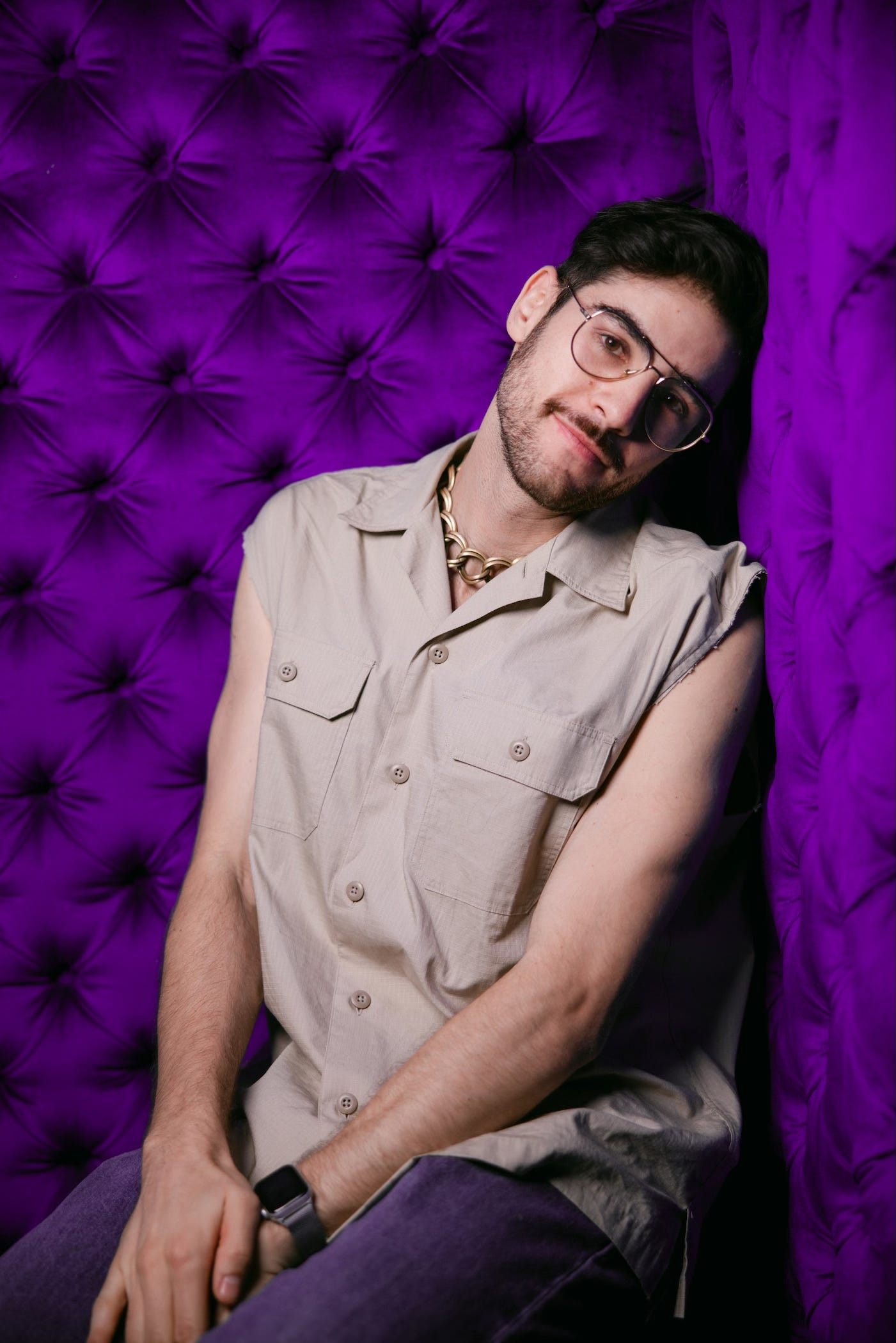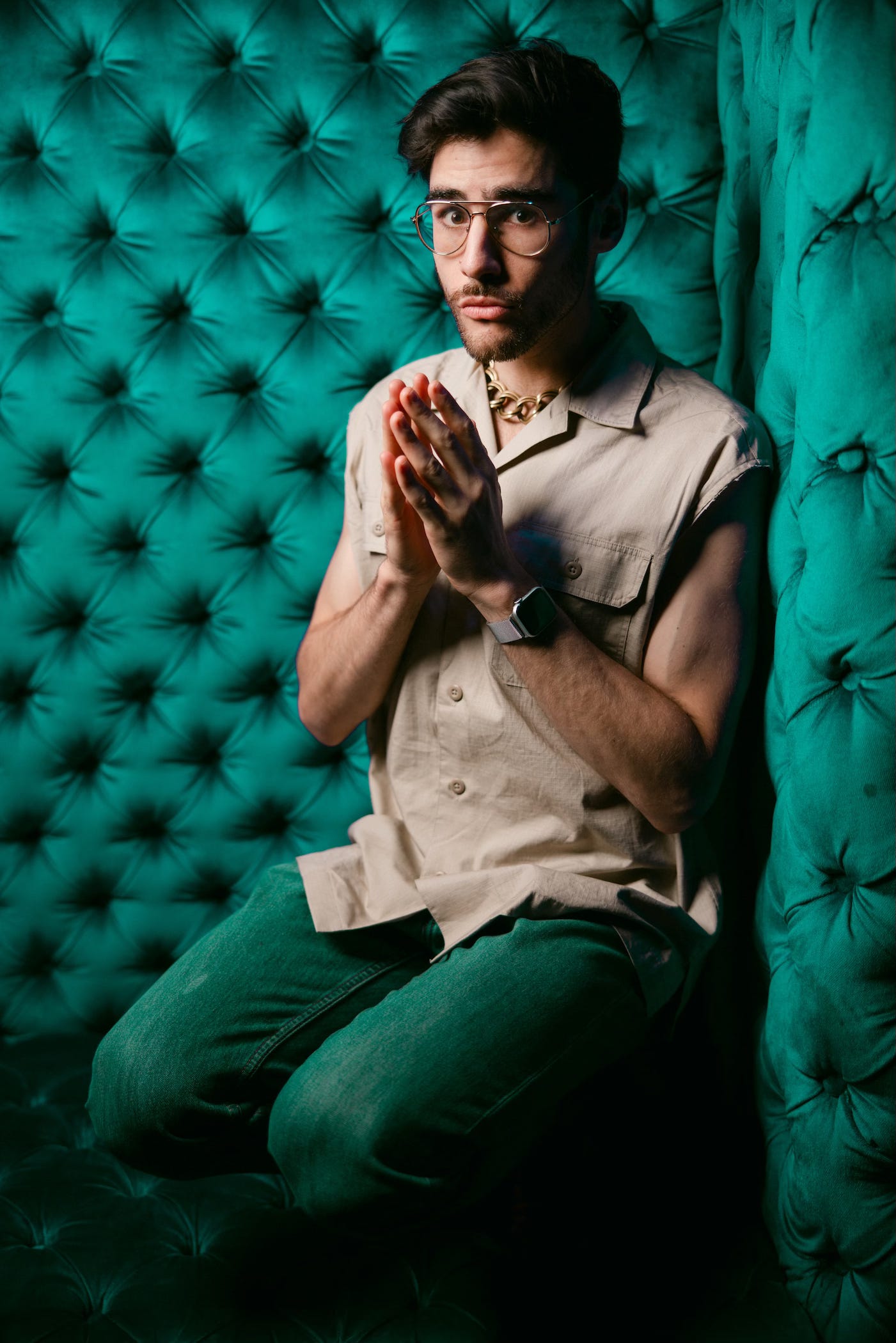Sam Morrison Makes You Laugh to Keep from Crying
The queer stand-up's new show, meant to get him through a period of suffering, is taking him to Broadway.
Sugar Daddy isn’t about that.
The new show, written and performed by queer comic Sam Morrison, is not about his life as an influencer traveling to Tulum on the private jet of his wealthy older keeper, it’s about his life as a young, diabetic, Jewish man whose silver-daddy partner died unexpectedly, early in the COVID pandemic.
If it doesn’t sound like a riot, reviews disagree — a run at the Soho Playhouse garnered the kind of take-this-to-Broadway raves that brought Cole Escola’s Oh, Mary! there. And Morrison, who counts Hannah Gadsby, Jerrod Carmichael and Mike Birbiglia among his influences, will bring Sugar Daddy to Broadway in 2025, after a run in L.A. that kicks off this month.
A review of the show in The New York Times notes that with Morrison, “the grief comes out in laughs.” He’ll make you laugh on the phone, too, even when you’re grilling him about a show that is likely to take his career to a whole new level, even as his life continues to adapt to the loss of a great love.
While in the midst of a work-in-progress performance of Sugar Daddy in Minneapolis, he took a break to speak with me, exuding something even better than confidence, which can be faked: charm.
When you lost your partner, Jonathan, what made you decide to memorialize him in a stand-up show? Why this format?
I think it's so many different reasons. I think probably the primary one was just that I started to perform again after he passed. That period of my life was ... I mean, even in my memory, it's hazy. I was really just floating. I was starting to do stand-up again. It was giving me energy in various ways. It just felt crazy to not talk about it because it was my whole experience. It was truly all I thought about.
Is it hard finding humor in such a sad situation?
There's a lot of emotions that are attached to it that aren't just sad, some of which I talk about in the show. Angst, anger, frustration, and, of course, comedy, humor. I just started to format these thoughts as jokes. I'm also a comedian who has done solo shows before, and I write about what I'm experiencing. This was all that I was experiencing and living at that moment. I just started to write jokes about it. It just, weirdly — I know it seems crazy — but from that point of my life, it just seemed like an extremely normal thing for me to do.
“As I’ve learned, I’m … different.”
Joan Rivers said you have to laugh to keep from crying.
Yeah. And as I’ve learned, I’m … different.
Your next show: I’m … Different.
[Laughs] I’m Different, Daddy. I think you do laugh to stop from crying at points. I think you do it to cope, and I think other times you do it to avoid. There's so many different reasons. Then other times you do it because it feels good.
Do you wonder what your late partner would have thought of the show?
Yeah, this is the part that always makes me emotional.
“This is the part that always makes me emotional.”
I’m sorry.
No, it's okay. It's all part of it. [Long pause] Yeah, I try to channel as much as I can — him — when I'm performing this, and I do feel like he would be very proud. Yeah, there's a lot that I think he would say and that I want to say to him. But I feel like he was with me for a time period when I had not very much success as a comedian, and I think he was in many ways my biggest fan. I think it was really exciting for both of us when something would happen. I just think he would be really happy for me from that standpoint.
It’s lovely that he could be a catalyst, in a way, if he had to leave you. Have you had fans react memorably to the show? It must trigger many emotions for a range of people.
Different people have really opened themselves up and shared really vulnerable parts of their own lives. That part is always very affecting and has influenced the show quite a bit. Eventually, I feel like the show becomes ... I think when I started to realize that there were people that had similar experiences to me is when I really started to realize what the show was and how I wanted it to take shape. It’s honestly been overwhelmingly positive. There's not much negativity, I think, that gets back to me. [Laughs]
No hecklers!
No! “That psycho is really about to lose it! But they, fortunately, don’t say that to my face. [Laughs]
How different is the show from when you first performed it?
When I first did the show, it really was a new show, from a a theater or a stand-up perspective; I really put it together for the Edinburgh Festival Fringe in six or seven month. When I put it up there, and even when I brought it to New York, there were still things that I wanted to work on, and there were still things that I wanted to expand and explore and other things that I wanted to tighten. In a lot of ways, it's just the natural progression of the show that is closer to what the image of the show is in my head. I think it's a lot tighter comedically and dramatically. It's largely still the same story.
The other aspect of it is that we get to bring in a whole team. Lighting and sound and set and stage — there was just no budget for the show. The off-Broadway version was just basically like a stool. I love theater, and I've always been a theater kid. I also love solo shows. I get to really explore and try to combine the genres of stand-up and theater in ways that I've always wanted to. I'm super excited to explore this new version.
Did you ever dream the show would be heading to Broadway?
Absolutely not. Mike Birbiglia had done his show at that point, but there really wasn’t much other precedent for it. When you think of a Broadway show, you think of ... I don't know. The budget for the show at Edinburgh was -$1,000. I remember when the idea of Broadway was first brought up to me, I was just laughing. It was phrased like a commercial theater producer, and I was like, “Yeah, I'll do more commercials.”
This is one of those on-the-spot questions, but where do you think you get the ability to turn dark subject matter into laughter?
I've always said that I do think stand-up is a learned skill. I think most people can get to a point where they are able to do that. I think it's a lot closer to playing the piano than most people would assume. I don't know if all stand-ups would agree with me, but definitely all stand-ups would agree that when you start, you're awful, and you have to learn how to be funny onstage. A lot of that is just simple joke-structure stuff and simple performance stuff. I think anyone who starts and works hard will grow in leaps and bounds. I don't think there's anything particularly special about the ability to turn darkness into comedy. I think most people have the capacity for it.
Don’t queer people excel at that?
A hundred percent. And older gay men are the goat of turning darkness into laughter.
Your partner being so much older than yourself, what do you make of the age-gap discourse?
I think that is an Internet thing I haven’t picked up on. I have an app blocker and literally try to stay off social media as much as I possibly can, except for posting.
I'm glad I haven't run into that too much. I mean, definitely, when I was dating Jonathan and my boyfriend before that was also twice my age, so I've always gone that direction. I've always been the guy that's been attracted to older guys and people didn't understand it, and I was coming up with justifications to people. Also, honestly, talking about it onstage helps quite a bit. But I think for a lot of people, it's very complicated. There are obviously situations where those questions are warranted and young people are taken advantage of all the time. I do think it's different with gay relationships straight relationships. But especially as someone who performs material about this stuff all the time, people come up to me and are like, “Hey, me too. I'm also attracted to daddy bears.” I'm like, “Stop whispering.”
[Laughs] That’s funny that people blurt this out to you.
I think it's such a taboo and people are excited to find other people like them. I just think it's so much more popular than people realize. That older guys and bigger guys are sexier than society's standard. It's still so unfathomable to a lot of people when it happens. I think things like “what could you guys have in common?” just comes from a real place of ignorance.
“When I was younger, I would have to really pursue older guys to a cartoonish extent.”
When I was younger, I would have to really pursue older guys to a cartoonish extent because they didn't believe that I was interested in them or they just weren't used to it. I would have to convince people that I was just interested in them for who they were. It’s a little … “Prove it.”
We know you’re very funny. What else are you good at?
Does ADHD count?
Yes.
No, I don’t know. Am I good at anything else? No. Okay? I only have one skill. [Laughs] I’m good at surviving, okay? I’m doing just fine. i also have a driver’s license. And I’m addicted to online chess. And I just recently got into tennis.
What about dramatic acting? I feel like you could excel there.
Oh, thank you. I’m auditioning. I love acting; I love working with other people, whether it’s acting or in a writers’ room or creating a solo show with a lighting designer, a sound designer and a director.
Finally, what’s your hottest hot take?
I think charcuterie boards are overpriced and not good. They're always, like, after 30 minutes, everything's sweating. I don't know, people. I've been to parties. It seems like the charcuterie boards are mostly left alone. Are people not into meats and cheeses as much as, I don't know, Trader Joe's would have us think?
I guess the meat-and-cheese people can fuck off.
Your words.
Sugar Daddy, directed by Stephen Brackett, runs September 20-October 13, 2024, at the Wallis Annenberg Center for the Performing Arts Lovelace Studio Theater in Beverly Hills. Tickets are available at TheWallis.org.






